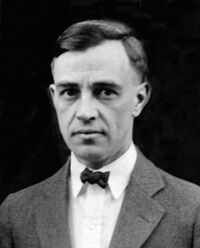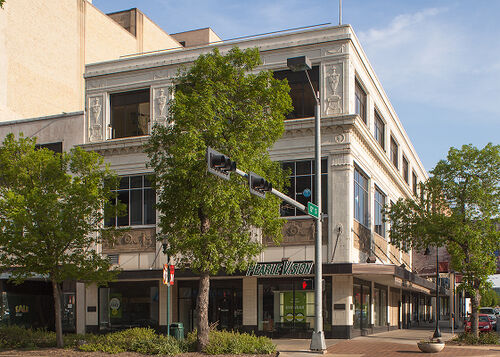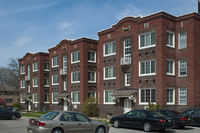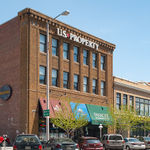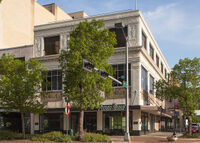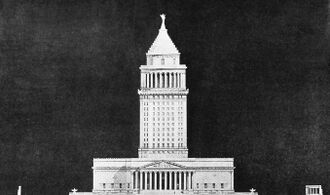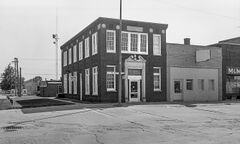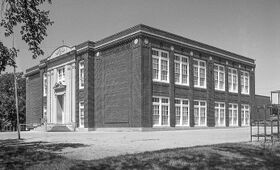Ellery Lothrop Davis (1887-1956), Architect
Davis worked as an independent architect from 1917-1921. In 1918 he hired Walter F. Wilson as a draftsman, then formed the firm of Davis & Wilson, Architects in 1921. Davis retired due to ill health in 1931, then returned to assist with a government contract to design a new Army Airfield in Denver in 1942 and remained active nearly until his death. He formally registered as an architect in the State of Nebraska in 1945.[22]
Davis was a member of the American Institute of Architects, the American Specification Institute, and the American Society of Testing Materials. Other of his affiliations included the Round Table Club, the Crucible Club, the University Club, and the Lincoln Country Club, and he was a Scottish Rite Mason and Shriner. Davis died March 20, 1956. He was survived by his wife, Mary Camille Hall Davis; a daughter, Mary Axtell of Omaha; and his son, Ellery Hall Davis, also of Lincoln.[1][5][6][8][9][10][11]
This page is a contribution to the publication, Place Makers of Nebraska: The Architects. See the Format and contents of Nebraska architect entries page for more information on the compilation and page organization.
Contents
Educational & Professional Associations
1903: graduate of Lincoln High School (valedictorian).[9][11]
1903-1907: A.B. University of Nebraska, Lincoln, Nebraska.[9] [11[a]
1909: Bachelor of Architecture, Columbia University.[7][9][11]
1908-1910: draftsman with Ferdinand Fiske, Lincoln, Nebraska.[7]
1909-1910: draftsman with George A. Berlinghof, Lincoln, Nebraska.
1910-1917: architect and partner, Berlinghof & Davis, Architects, Lincoln.[9][11]
1917-1921: architect, Ellery L. Davis, Architect, Lincoln, Nebraska.[9][11]
1921-1931: architect and partner, Davis & Wilson, Architects, Lincoln, Nebraska.[11][22][52][al]
1931-1942: inactive partner, Davis & Wilson, Architects, Lincoln, Nebraska.[11][22][b]
1942-1955: architect and partner, Davis & Wilson, Architects, Lincoln, Nebraska.[11][22][b]
1945: Registered Professional Architect, Nebraska, September 5, 1945; A-156.[11]
Other Associations
1918-1921: employed Walter F. Wilson, as architect and superintendent.
Buildings & Projects
1909-1910
Hagenow Building (1909), 1701-1705 O St., Lincoln, Nebraska.[3] (LC13:D08-053)
Ticket booth for University Athletic Board (1909), 1002 T St., Lincoln, Nebraska.[14][c]
1910-1917
From 1910-1917, Davis practiced in partnership with George A. Berlinghof as Berlinghof & Davis, Architects.
One project during this period, the Floral Court Apartments, was the work of Ellery Davis alone. Not only was the project developed by Ellery and Camille Davis as owners, Davis can be identified as the designer of this project based on drawings filed with the building permit. The elevation is inscribed “Apartment Building for Mrs. Ellery Davis Lincoln Nebr. Ellery Davis Architect Lincoln.” These drawings are the only ones so far found inscribed by Davis alone, during the period of the Berlinghof & Davis partnership.
Floral Court Apartments, (1915), 1735-39 G St, Lincoln, Nebraska.[13:52][26][27:93] (LC13:D07-005)
1917-1921
Miller & Paine, Fourth Store (1917), 1215 O St, Lincoln, Nebraska.[12][15][28][d]
Dr. G.O.W. Farnham Garage and Auto Sales Building - Duteau Chevrolet Building (1917), 1801 O St., Lincoln, Nebraska.[12][16][32] (LC13:D09-538)[e]
Remodeling at Oliver Theater (1917), 145 N. 10th St., Lincoln, Nebraska.[12][13:10][18][f]
Magee’s Store Building (1917-1918), 1201 O St, Lincoln, Nebraska.[12][19][29][o] (LC13:C08-307)
Rudge & Guenzel Building (1917-1918), NW corner 13th & N, Lincoln, Nebraska.[12][30] (LC13:C08-004) [n]
Union Wall Paper & Paint Company Building (1917-1919), 1320 P, Lincoln, Nebraska.[12][17]
Project for eight-story building for Turner & Holmes (1917-1918) northwest corner of 13th & O, Lincoln, Nebraska.[25][33][q]
William A. McCullough House (1917-1918), 2122 15th Ave, Central City, Nebraska.[33][r] (MK02-198)
David City Telephone Building (1917-1920) [Lincoln Telephone Company, Std. Bldg. 1], David City, Nebraska.[12][31][40][p] (BU05-028)
Nebraska City Telephone Building (1918-1921) [Lincoln Telephone Company, Std. Bldg. 2], Nebraska City, Nebraska.[12][43][aa] (OT06:B-016)
Lewiston School (1918), Pawnee County Dist. 69, Lewiston, Nebraska.[12][35][u]
Fairbury Telephone Building (1918-1920) [Lincoln Telephone Company, Std. Bldg. 4], Fairbury, Nebraska.[12][34]
Project for a new building, remodeling of premises for Nebraska Farmer (1918), 1400 P, Lincoln, Nebraska.[12][23][34][s]
First National Bank of Aurora (1918), Aurora, Nebraska.[36][t] (HM01-191)
Remodeling of shop at Oliver Theater (1918), 137 N. 10th, Lincoln, Nebraska. [12][13:10][20][f]
Alterations (1918), Gold & Company Store (Spiers Store), N 10th, Lincoln, Nebraska.[12]
Shelton School and dormitory for the Nebraska Adventist Conference (1918), Shelton, Nebraska.[12][36][37][g]
Goehner School (1918), Goehner, Nebraska (in association with Ben H. Hughes, Seward, Nebraska.[12][35][36][w] (SW05-013)
Valparaiso School (1918-1919), Saunders County Dist. 101, Valparaiso, Nebraska.[12][38][v] (SD15-024)
Eagle-Union High School (1918-1919), Cass County Dist. 104, Eagle, Nebraska.[12][39][x]
Remodel Mayer Bros. Store for Eli Shire (1919), 1023 O, Lincoln, Nebraska.[12][24]
York Telephone Building (1919) [Lincoln Telephone Company, Std. Bldg. 3], York, Nebraska.[12]
Store for Paul Holm (1919), 117 S. 14th, Lincoln, Nebraska.[12][21]
George R. and Helen Dutton house (1919-1920), 850 N. Burlington Ave, Hastings, Nebraska.[12] (AD04-442)
Nebraska Capitol Competition, final stage (1919-1920), Lincoln, Nebraska.[2]
Chadron High School (1920-1921), southeast corner 6th & Ann, Chadron, Nebraska.[12][44][45][51][ad] (DW03-054)
Kenwood School (1920-1921), Lake & Norfolk Ave., Chadron, Nebraska.[12][45][51][ad] (DW03-049)
Ainsworth School (1920), Ainsworth, Nebraska.[45][af]
West Point High School (1920), Bridge & Park, West Point, Nebraska.[12][41][z]
Project for Markell Garage (1920), Lincoln, Nebraska.[12][13:20][42][43][l]
Superior Telephone Building (1920-1922) [Lincoln Telephone Company, Std. Bldg. 1a], Superior, Nebraska.[12][40][42] (NU13-718)
Mead School (1920-1921), Saunders County Dist. 72, Mead, Nebraska.[12][43][ab] (SD08-003)
Project for Lincoln Sanitarium (1920), Lincoln, Nebraska.[44][ac]
Municipal building for police, fire and health departments (1920-1921), 10th & Q, Lincoln, Nebraska.[45][53][ae]
Addition and alteration (1920), South Exchange Building, Lincoln Telephone Company, Lincoln, Nebraska.[12][h]
Nebraska State Hospital (1920), Milford, Nebraska.[12][46][ag]
Plainview High School (1920), Pierce County Dist. 5, Plainview, Nebraska.[12] (PC06-014)
University Place School (1920-1925), 4601 Adams, Lincoln, Nebraska.[12][13:69][40][y]
Kitchen addition (1921), Nebraska Home for Dependent Children, Lincoln, Nebraska.[12][47
Curtis School (1921), Curtis, Nebraska.[50][51][ai] (FT01-002)
Ohiowa School (1921), Ohiowa, Nebraska.[50][aj] (FM09-023)
Farmers & Merchants Bank (1921), McCook, Nebraska.[50][ak]
Gold & Company store (1921), Lincoln, Nebraska.[48][ah]
1921-1956
In 1921, Davis and Walter F. Wilson formed Davis & Wilson, Architects. The firm survived Davis’s death in 1956, at which time his son, Ellery Hall Davis (1912-2003), Architect, assumed the mantle of Davis partner in the firm. The firm was reorganized in December of 1968 as Davis Fenton Stange Darling, Architects, which was succeeded in 1995 by Davis Design, Architects.
During the transition into the Davis & Wilson partnership, and continuing for a few years after, building permits or drawings for a few projects listed below bore only Davis’s name.
Relocation and remodeling of Mariel Gere House (1923), 2811 S 24th, Lincoln, Nebraska.[54][am]
Ellery Davis House (1924), 2740 Van Dorn, Lincoln, Nebraska. (LC13:E05-038)
Undated
Bookcases for H. K. Burket (n.d.), Lincoln, Nebraska.[12][13][i]
C. M. Clark house (n.d.), Lewiston, Nebraska.[12]
Remodel (n.d.), Domestic Science Building, University Place, Lincoln, Nebraska.[12][13:32]
Alterations (n.d.), H. A. Ensign Garage, Lincoln, Nebraska.[12][13:54][j]
Remodel (n.d.), Fair Store, Beatrice, Nebraska.[12][13:55]
Porch addition (n.d.), E. J. Hainer house, Lincoln, Nebraska.[12][13:4-5][k]
Merna Bank (n.d.), Merna, Nebraska.[12]
Marquee (n.d.), Perkins Huffman Company, Lincoln, Nebraska.[12][m]
Alterations (n.d.), Gen. John J. Pershing house, 1748 B, Lincoln, Nebraska.[12][13:66]
Addition (n.d.), Apartment House for Harvey Rathbone, Lincoln, Nebraska.[12][13:53]
Shop addition (n.d.), Tecumseh School, Tecumseh, Nebraska.[12][13:3]
Writings
Ellery Davis, Architect, "Economical Proportions of Concrete Slabs and Simple Concrete Beams," American Architect 113 (1919), 779.
Notes
a. Sources on Davis’s dates of graduation, partnership, etc. vary by a few years, even when Davis himself was probably the source. The dates offered here are those deemed most reliable and consistent among the several sources; divergent dates are mentioned in the references below.
b. The white pages of the Lincoln City Directories do not list affiliation with Davis & Wilson for the years 1942-1950.
c. The original building permit for the Hagenow Building is for a two-story commercial building, while the accompanying drawings mention a third story “not to be built at present but column at top of second story must be provided for.” A second permit was issued three months later for the third story addition, presumably during one continuous construction campaign.
d. This project appears to be Davis' first independent project following the cessation of his eight-year partnership with George Berlinghof. American Contractor of July 1917 states: "Store & Office Bldg: $40,000. 2 sty. & bas. 50x142. ) st. betw. 12th & 13th sts. Archt. E. L. Davis, 515 Security Mutual Life bldg. Owners Miller & Paine,...Brk., Bedford or Carthage cut stone, tar & gravel r comp. rfg. Prelim. plans."[28]
Drawings filed with the building permit depict a two-story storefront with Neo-classical terra cotta trim. Labeled “Fourth store Building for Mssrs. Miller & Paine,” the building replaced 3-story storefronts shown on those lots on the 1903 Sanborn Map Co. atlas of Lincoln. Images in the Macdonald Studio Collection of the Nebraska State Historical Society depict the storefront in 1931 (Macdonald images RG2183-1931-504-3 and RG2183-1931-429). In 1938 and 1939, Miller & Paine obtained building permits to alter and add to the existing two-story building with a new O Street façade, resulting in a 5-story building with a sleek limestone front, which Miller & Paine leased to Ben Simon’s store. Davis & Wilson designed the 1939 project, extending and re-facing the 1917 Davis-designed building.
e. American Contractor of December 29, 1917 describes this project as: "Garage: $40,000. 100x142. 18th & O sts. Archt. Ellery Davis...Owner Dr. G. O. W. Farnham. Gen. contr. let to Olson Constr. Co."[32] This two-story automotive sales building was originally occupied by Hussong Ford. In 1922, Davis & Wilson doubled the building, extending it east another 100 feet. DuTeau Chevrolet occupied the structure for decades.
f. Two building permits were issued eight months apart for $5,000 of remodeling work on F. D. Eager’s Oliver Theater building, which stretched a half-block from 137-147 North 13th Street.
g.American Contractor of June 1, 1918, rather cryptically reports: "School & Dormitory: $6,000. 2 sty. & bas. Exact location undecided. Archt. Ellery Davis... Owner Nebraska Conference, care of J. S. Rouse, Colby & View. Fdn. in."[36] According to the U. S. Census of 1920, John S. Rouse was a minister in College View, Nebraska, an Adventist suburb southeast of Lincoln. "Colby & View" is a typographical error. The June 15, 1918 edition clarified: "School & Dormitory: $60,000. 2 sty. & bas. Sheldon, Nebr. Archt. Ellery Davis...Owner Nebraska Conference of Adventists, care of J. S. Rouse, Colby [sic] View, Nebr. Frame, shingle rfg., brk fdn. Will take bids soon."[12][36][37]
h. In association with Vernon F. Tinsley Associates.[12]
i. Homer K. Burket lived at 1934 F St. in Lincoln in 1920.
j. Ensign operated Ensign Omnibus and Transfer Co. at 221 S. 11th St. in Lincoln in 1920.
k. Eugene. J. Hainer resided at 1139 S. 19th Street (19th & A Sts.) in Lincoln in 1920.
l. John H. Markel operated Markel-Cropsey Airplane Co. at 1726 O St. in Lincoln in 1920, which was originally an automotive sales building design by “’Berlinghof & Davis’” and built in 1917. "American Contractor" of March 27, 1920 announced another project: "Lincoln, Nebr....Garage: $125,000. 4 sty. 60x142. 18th & O sts. Archt. Ellery Davis, Security Mutual Life bldg. Owner J. H. Markle [sic], 1705 O st. Brk. & stone. Drawing prelim. plans." In April 1920, "Final plans" were announced.[42][43]
m. Perkins Huffman operated a store at 1112-1114 O St. in Lincoln in 1920.
n. This department store was being designed at the time of dissolution of the Berlinghof & Davis partnership and apparently had involvement by the partners together and separately. While the plans filed with the City of Lincoln for a building permit were inscribed "Berlinghof and Ellsworth," American Contractor repeatedly listed the project designers as "Archt. G. H. Ellsworth...Consultg. Archt. Elery [sic] Davis" in 1917 and 1918[30]
o. American Contractor of Oct. 6, 1917 describes this project as:"Store Bldg.: $75,000. 3 sty. & bas. 50x142. 12th & O sts. Archt. Elery [sic] Davis...Owner Magee Clothing Co., 1109 O st. Press & com. brk., Bedford or Carthage cut stone, t. c., re. conc., tar & gravel or comp. rfg. Plans drawn."[29]
p. American Contractor of Dec. 29, 1917 describes this project as:"Telephone Bldg.: $10,000. 2 sty. & bas. 22x56. David City, Nebr. Archt. Ellery Davis...Owner Lincoln Telephone Company, both of Lincoln. Brk., stone, re. conc., tar & gravel or comp. rfg. Final plans." On March 2, 1918, that publication announced: "Time for letting extended; new date soon." "Soon" did not arrive for almost two years, as the Bebruary 7, 1920 edition states: "Bldg. (telephone): $20,000. 2 sty. & bas. 22x56. David City, Nebr. Archt. Ellery Davis...Brk. & stone, comp. rfg. Plans drawn; taking bids." The awarding of $42,000 in contracts was announced March 27, 1920, with the same general contractor for the David City and Superior buildings.[31][40][42]
q.American Contractor of Dec. 22, 1917 describes this project as:"Store & Office Bldg.: $100,000. 3 sty. or more. 23x142. 13th & O sts. Archt. Ellery Davis...Owners M. W. Turner & E. B. Holmes... Brk., t. c., tar & gravel or comp. rfg. Final plans."[33]
r. American Contractor of Dec. 22, 1917 describes this project as:"Res.: $15,000. 2 sty. & bas. 23x142. Central City, Nebr. Archt. Ellery Davis...Owner W. A. McCullough... Brk. & stone trim, proby. slate or comp. rfg. Final plans."[33]
According to the 1920 Census, William A. and Margaret McCullough lived at 2122 15th Ave. in Central City. Their large, brick, colonial revival house still stands at that location.
s. McKelvie initially had Davis prepare plans for a new building, according to American Contractor of March 9, 1918, which describes a $40,000 "store building" on 17th St. between O and P Streets in Lincoln. That project was announced to be "indefinitely postponed" on April 20, 1918.[34]
t. American Contractor of June 1, 1918, reports: "Bank: $10,000. 1 sty. & bas. 22x60. Aurora, Nebr. Archt. Ellery Davis...Owner 1st Natl. Bank, Aurora. Brk., Bedford cut stone. Drawing Plans." By June 15, the notice reads: "Final plans."[36]
u. American Contractor of June 1, 1918, reports: "School: $40,000. 2 sty. & bas. Lewiston, Nebr. Archt. Ellery Davis... Brk., stone, t. c. & re. conc. Vote bonds June 8 for increase in amount for building purposes. Drawing Plans."[36]
v. American Contractor of July 6, 1918, reports: "Valparaiso, Nebr.--School: $75,000. 2 sty. & bas. Archt. Ellery Davis...Drawing plans."[38]
w. American Contractor of April 27, 1918, lists a $30,000 school for Goehner, Nebraska by "Archt. Ellery Davis." In the edition of June 1, 1918, Davis is again listed as architect but additionally mention is made of "Consltn. Archt. Ben. Hughes...both of Lincoln."[35][36]
x. American Contractor of December 28, 1918 identifies the estimated cost of the Eagle, Nebraska school as $85,000 and states "Plans drawn. Taking bids Jan. 23." The edition of February 15, 1919, states that the contract was let in the amount of $75,671.[39]
y. American Contractor of February 14, 1920 lists: "School (htg., plmg. & wiring): University Place, Nebr. Archt. Ellery Davis...Lincoln. Owner B. of E...University Place. Bids to close Feb. 17."[40]
z. American Contractor of February 7, 1920 lists: West Point, Nebr. Archt. Ellery Davis...Lincoln. Owner B. of E...West Point. Brk., comp. rfg. Owner taking bids to Feb. 24." In April 1920, the contracts were announced to have been let, for $191,544.25.[41][43]
aa. American Contractor of April 10, 1920 lists: "Telephone Bldg.: $35,000. 2 sty. & bas. 70x40. Nebraska City, Nebr. Archt. Ellery Davis...Lincoln. Owner Lincoln Tel. & Telg. Co. 14th & M. Brk. & t. c. Prelim. plans in progress."[43]
ab. American Contractor of April 10, 1920 lists the Mead project at $125,000, measuring 123x125. G. B. Unthank of Lincoln was the general contractor.[43]
ac. American Contractor of April 3, 1920 describes a project for "Hospital: $85,000. 4 sty. & bas. 25x142. 14th & M. Archt. Ellery Davis...Owner Lincoln Sanitarium, Dr. H. H. Everett. Brk. & re. conc., comp. rfg., frpf. Drawing plans."[44]
ad. American Contractor of April 3, 1920 describes: "School: $300,000. 2 sty. & bas. Chadron, Nebr. Archt. Ellery Davis....Brk. & re. conc., t. c., stone, comp. rfg. Drawing plans." In November 1920, the cost for "high & ward" schools was estimated at $300,000. An announcement of January 15, 1921, described the "Date of bids indefinite postponed." In September 1921, the contracts for both a $300,000 high school and a $70,000 grade school were announced as awarded. "Wilson & Davis" and "Davis & Wilson" were cited as the architects for projects that began the year before under Davis.[44][45][48][51]
ae. American Contractor of November 13, 1920 describes: "Bldg. (fire, police & health dept.): $200,000. Archt. Ellery Davis....Owner city of Lincoln...Brk. Drawing plans." The Bridgemen's Magazine of January 1921 notes the 10th & Q location in Lincoln and an estimated cost between $100,000 and $150,000.[45][53]
af. American Contractor of November 13, 1920 describes a school for Ainsworth School District as "$175,000. 55x150. Ainsworth, Nebr. Archt. Ellery Davis....Prelim plans."[45]
ag. American Contractor of March 5, 1921 announces the awarding of contracts for $100,000 for a hospital at the Milford, Nebraska Soldiers Home. "Archt. Ellery Davis....Wk to start soon."[46]
ah. American Contractor of January 8, 1921 lists the beginning of a projects as: "Store. 5 sty. Archt. Ellery Davis...Owner Gold & Co. Ivory enameled t. c. Prelim plans."[47]
ai. American Contractor of August 6, 1921 describes a $70,000 school project for Curtis, Nebraska, by "Archt. Ellery Davis...Lincoln." That same edition included contained one of the publication's first mentions of the Davis & Wilson partnership, in association with the Chadron Schools which Davis had begun the year before.[50][51]
aj. American Contractor of August 6, 1921 also describes a $70,000 school project for Ohiowa, Nebraska, by "Archt. Ellery Davis...Lincoln...Bonds votes; drawing plans." The planned school is described as 2 stories and basement, of brick, stone, and reinforced concrete.[50]
ak. American Contractor of August 6, 1921 also describes awarding contracts for a $25,000 Farmers & Merchants Bank for McCook, Nebraska, "2 sty. & bas. 25x90. McCook, Nebr. Archt. Ellery Davis."[50]
al. In September 17, 1921, American Contractor carries the announcement that "Davis & Wilson, architects, have succeeded Ellery Davis at Lincoln, Nebr. The offices remain in the Security Mutual Life Bldg., that city."[52]
am. The Charles Gere House was constructed at 837 D Street in Lincoln around 1892. In 1923 Gere's daughter Mariel, a teacher at Lincoln High School, had the house relocated to the southwest corner of 24th and Van Dorn Streets, and remodeled from its original Queen Anne style to a Tudor Revival exterior appearance. Ellery Davis is listed on the building permit as her architect for the project.[54]
References
1. Edward F. Zimmer, “Davis & Wilson,” in David J. Wishart (ed.), Encyclopedia of the Great Plains (Lincoln: University of Nebraska Press, 2004), 75-76, accessed February 22, 2013, http://plainshumanities.unl.edu/encyclopedia/doc/egp.arc.015
2. American Architect 117:2327 (July 28, 1920).
3. City of Lincoln Building Permits (and accompanying applications and drawings) #3223, July 10, 1909; and #3369, September 23, 1909; Architect “Ellery Davis.”
4. Butch Mabin, “Davis Design has been shaping Lincoln since adolescence,” Lincoln Journal Star (March 2, 2003), 30M.
5. “Ellery Davis, Longtime Local Architect, Dies At Age of 69,” Lincoln Star (March 22, 1956), 6:1.
6. “Dean Davis Dies; Pneumonia Victim,” Lincoln Star (February 4, 1918), 4.
7. Jim Stange, “Davis Design: Design Excellence since 1912,” Preservation Association of Lincoln, Brown Bag Lecture Series, Museum of Nebraska History, Lincoln, May 13, 2003. Lists Davis’s Columbia degree as 1908.
8. James T. Lees, “Ellery Williams Davis, Ph.D., 1857-1918: Dean of the College of Arts and Sciences,” The University Journal (Alumni Edition) (April 1918), 2-3.
9. “Ellery Lothrop Davis,” in Robert M. Baldwin, Who’s Who in Lincoln, 1928 (Lincoln: _____, 1928), 68.
10. AIA Historical Directory of American Architects: A Resource Guide to Finding Information About Past Architects, accessed April 27, 2010, http://communities.aia.org/sites/hdoaa/wiki/Wiki%20Pages/ahd1010139.aspx
11. Application for Registration to Practice Professional Engineering and Architecture, Nebraska State Board of Examiners for Professional Engineers and Architects, August 10, 1945. Nebraska State Historical Society RG081 SG2. Lists Davis’s University of Nebraska graduation date as 1906, Columbia degree as 1908, and Berlinghof and Davis partnership dates as 1909-1917.
12. Tom Kaspar, comp. Inventory of architectural records in the archives of Davis Fenton Stange Darling, Architects, Lincoln, Nebraska. 1996. Nebraska State Historical Society, RG3748, Box 16.
13. “Davis-Fenton-Stange-Darling Architects and Engineers: Architectural and Construction Documents,” Instrument of Donation, Davis Fenton Stange Darling Collection, Nebraska State Historical Society, RG3748, July 18, 1977.
14. City of Lincoln Building Permit (and accompanying application) #3425, October 14, 1909; Architect “Ellery Davis.”
15. City of Lincoln Building Permit (and accompanying application) #7236, September 29, 1917, Architect “Ellery Davis.”
16. City of Lincoln Building Permit (and accompanying application) #7288 November 30, 1917, Architect “Ellery Davis & Trussed Concrete Steel Co.”
17. City of Lincoln Building Permit (and accompanying application) #7926, May 26, 1919, Architect “Ellery Davis.”
18. City of Lincoln Building Permit (and accompanying application) #7298, December 22, 1917, Architect “Davis.”
19. City of Lincoln Building Permit (and accompanying application) #7392, Apr. 29, 1918, Architect “Ellery Davis.”
20. City of Lincoln Building Permit (and accompanying application) #7549, August 6, 1918, Architect “Ellery Davis.”
21. City of Lincoln Building Permit (and accompanying application) #8187, September 30, 1919, Architect “Ellery Davis.”
22. A Century of Design Excellence, 1912-2012, Davis Design, centennial publication by the firm, 2013.
23. City of Lincoln Building Permit (and accompanying architectural drawings) #7442, May 16, 1918, “Ellery Davis Architect.”
24. City of Lincoln Building Permit (and accompanying architectural drawings) #7695, February 27, 1919, “Ellery Davis Architect.”
25. ”Building to be Erected at the Northwest Corner of Thirteenth and O Streets by Turner & Holmes,” Sunday State Journal [Lincoln], (January 6, 1918), 12B.
26. City of Lincoln Building Permit (and application) #5984, Building & Safety Department, May 3, 1915. The owner is listed as Camille Davis, with Ellery Davis, Architect.
27. “Davis-Fenton-Stange-Darling Architects and Engineers: Architectural and Construction Documents,” Instrument of Donation, Davis Fenton Stange Darling Collection, Nebraska State Historical Society, RG3748, July 18, 1977.
28. American Contractor (July 21, 1917), 66C.
29. American Contractor (October 6, 1917), 77.
30. American Contractor (October 27, 1917), 55; (April 13, 1918), 66.
31. American Contractor (December 22, 1917), 49; (March 2, 1918), 68.
32. American Contractor (December 29, 1917), 44.
33. American Contractor (December 29, 1917), 58.
34. American Contractor (March 9, 1918), 56; (April 20, 1918), 74.
35. American Contractor (April 27, 1918), 63.
36. American Contractor (June 1, 1918), 74; (June 15, 1918), 35.
37. American Contractor (June 15, 1918), 64.
38. American Contractor (July 6, 1918), 47.
39. American Contractor (December 28, 1918), 32; (February 15, 1919), 79.
40. American Contractor (February 7, 1920), 47.
41. American Contractor (February 14, 1920), 58.
42. American Contractor (March 27, 1920), 81F.
43. American Contractor (April 10, 1920), 76.
44. American Contractor (April 3, 1920), 87.
45. American Contractor (November 13, 1920), 59.
46. American Contractor (March 5, 1921), 88C.
47. American Contractor (March 12, 1921), 75C.
48. American Contractor (January 8, 1921), 51D.
49. American Contractor (January 15, 1921), 70H.
50. American Contractor (August 6, 1921), 81C-82C.
51. American Contractor (September 10, 1921), 63.
52. American Contractor (September 17, 1921), 39.
53. The Bridgemen's Magazine (January 1921), 48.
54. City of Lincoln Building Permit (and application) #11487, Building & Safety Department, 1923. The owner is listed as Mariel Gere, with Ellery Davis, Architect.
Page Citation
E. F. Zimmer and D. Murphy, “Ellery Lothrop Davis (1887-1956), Architect,” in David Murphy, Edward F. Zimmer, and Lynn Meyer, comps. Place Makers of Nebraska: The Architects. Lincoln: Nebraska State Historical Society, May 15, 2013. http://www.e-nebraskahistory.org/index.php?title=Place_Makers_of_Nebraska:_The_Architects Accessed, November 24, 2024.
Contact the Nebraska State Historic Preservation Office with questions or comments concerning this page, including any problems you may have with broken links (see, however, the Disclaimers link at the bottom of this page). Please provide the URL to this page with your inquiry.
